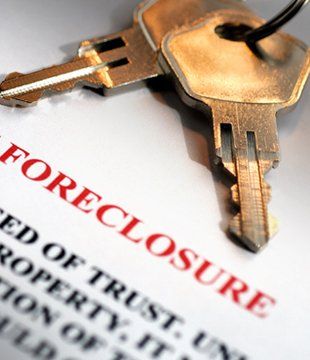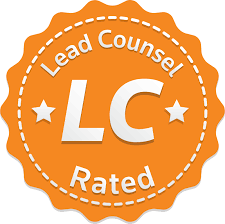Foreclosure
Foreclosure
The Columbus bankruptcy attorneys
at Bergman & Yiangou
may be your answer to foreclosure. When financial issues
lead to this threat, Chapter 7 or Chapter 13 Bankruptcy can give you opportunity to keep your home.
In these difficult economic times, home foreclosures are on the rise. Losing a home through a foreclosure and a subsequent sheriff auction is both a traumatic and worrisome experience. Chapter 7 and Chapter 13 bankruptcy can alleviate the stress brought about by foreclosure. Filing either of these chapters of bankruptcy will put an automatic stay on a pending sheriff sale, allowing you additional time to remain in your home. Over the years the bankruptcy attorneys at Bergman & Yiangou have taken on thousands of cases dealing with home foreclosures in both Chapter 7 and Chapter 13. Our attorneys will work with you to determine your options so that the best financial decision is made for your future.
Foreclosure not only results in the loss of the home, but often causes a complete change in lifestyle and surroundings. Families are typically displaced to another neighborhood, and children are forced to change schools. The foreclosure and sale of a persons’ home can occur for reasons beyond their control and can having lasting impact on a person and his or her family.
What is foreclosure?
Black’s Law Dictionary defines foreclosure as “the forced sale of real estate to pay off a loan on which the owner of the property has defaulted.” A default on a mortgage loan can occur because of several factors. Many times home foreclosure is the end result of the loss of a job, the inability to work due to a debilitating medical condition, excessive and insurmountable debt, and/or divorce. These contributing factors then result in missed mortgage payments. While the foreclosure process varies by state, missed payments are typically followed by a letter or phone call from your mortgage company stating you are in default. As more missed payments accumulate, the phone calls and letters will become more frequent. Eventually, you will receive a notice from the mortgage company that they will begin to accelerate the collections process if you do not cure the default within a certain time frame. After this time frame passes, the mortgage company will contact their attorney who will then file foreclosure papers in your local courts. At this point, you will be responsible for both the mortgage company’s attorneys’ fees and the delinquent payments or arrearages.
Foreclosure in Progress
Once the foreclosure process has begun, mortgage lenders are often unwilling to work with you. You may be able to negotiate a refinance or loan modification with your lender, or perhaps qualify for a government supported program such as the Making Home Affordable Program (HAMP). What can you do you if you want to keep your home but are not qualified for a loan modification, refinance, or the HAMP program, a Chapter 13 bankruptcy can be a possible solution.
Chapter 13 Bankruptcy and Foreclosure
By filing a Chapter 13 bankruptcy, you may be able to save your home from foreclosure. The filing of a Chapter 13 bankruptcy results in an automatic stay, or hold, on any pending or ongoing court cases, including foreclosures. The stay prevents creditors from taking any action against you without prior approval from the bankruptcy courts. When preparing to file a Chapter 13 bankruptcy, your attorney will analyze your income and expenses to determine whether or not it will be possible for you to actually save your home from an ongoing or looming foreclosure. Chapter 13 cases last from three to five years. Your attorney will review your budget and construct a repayment plan that includes payment of your monthly mortgage, as well as payment of the mortgage arrearage that brought about the foreclosure or default. These payments are made to the Chapter 13 trustee, who administers your case and makes monthly distributions to your creditors. At the end of your Chapter 13 bankruptcy case, and assuming all monthly payments are made, the Chapter 13 trustee will review your case, file a motion to deem your mortgage current, and allow you to save your house from foreclosure.
Chapter 7 Bankruptcy and Foreclosure
What happens if you do not wish to save your home, or the monthly payment amount to devote to a Chapter 13 bankruptcy case to save your home is not affordable based on your budget? If you do nothing and the foreclosure process is completed, your home will be sold through a sheriff sale and you are still responsible for the deficiency amount. The deficiency amount is the difference between the amount you owed to the mortgage company and the amount received at sheriff’s sale. If you owed $100,000 on your mortgage and the home sold for only $80,000, the mortgage company could still demand the $20,000 difference. A Chapter 7 bankruptcy
can be a possible solution. The deficiency amount owed to a creditor can be included in a Chapter 7 case and your obligation for this debt will be discharged upon case completion. In addition, the filing of the Chapter 7 prevents the sale of your home until the mortgage company obtains relief from the automatic stay. During this time, you conceivably can remain in your home for months without making a mortgage payment and your home will not be put into foreclosure.
Call the Columbus bankruptcy attorneys at Bergman & Yiangou to provide you with trustworthy legal counsel regarding any impending foreclosure concerns.
With two offices in Columbus, OH, Bergman & Yiangou Attorneys at Law
represent clients throughout central Ohio and in the following cities and communities; Franklin County, Fairfield County, Delaware County, Licking County, Madison County, Pickaway County and more!
Content, including images, displayed on this website is protected by copyright laws. Downloading, republication, retransmission or reproduction of content on this website is strictly prohibited. Terms of Use
| Privacy Policy




